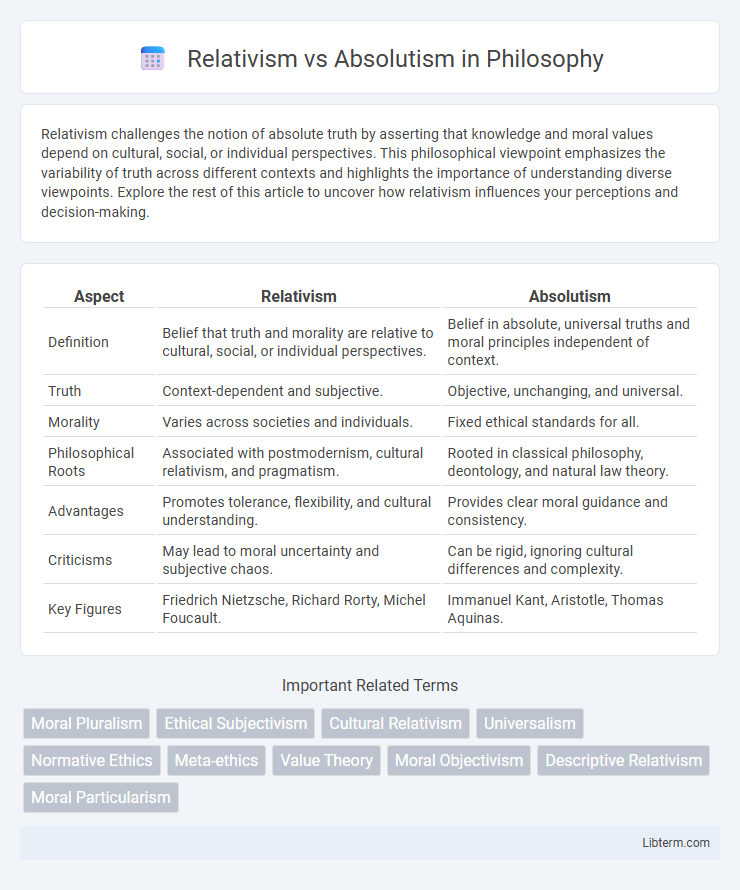Relativism challenges the notion of absolute truth by asserting that knowledge and moral values depend on cultural, social, or individual perspectives. This philosophical viewpoint emphasizes the variability of truth across different contexts and highlights the importance of understanding diverse viewpoints. Explore the rest of this article to uncover how relativism influences your perceptions and decision-making.
Table of Comparison
| Aspect | Relativism | Absolutism |
|---|---|---|
| Definition | Belief that truth and morality are relative to cultural, social, or individual perspectives. | Belief in absolute, universal truths and moral principles independent of context. |
| Truth | Context-dependent and subjective. | Objective, unchanging, and universal. |
| Morality | Varies across societies and individuals. | Fixed ethical standards for all. |
| Philosophical Roots | Associated with postmodernism, cultural relativism, and pragmatism. | Rooted in classical philosophy, deontology, and natural law theory. |
| Advantages | Promotes tolerance, flexibility, and cultural understanding. | Provides clear moral guidance and consistency. |
| Criticisms | May lead to moral uncertainty and subjective chaos. | Can be rigid, ignoring cultural differences and complexity. |
| Key Figures | Friedrich Nietzsche, Richard Rorty, Michel Foucault. | Immanuel Kant, Aristotle, Thomas Aquinas. |
Defining Relativism: Key Concepts
Relativism asserts that truth, morality, and knowledge are context-dependent and vary across cultures, societies, or individuals, rejecting universal standards. Key concepts include cultural relativism, which emphasizes understanding beliefs within specific cultural frameworks, and moral relativism, which denies objective moral truths. This perspective challenges absolutism by arguing that ethical principles are not fixed but adapt to differing perspectives and circumstances.
Understanding Absolutism: Core Principles
Absolutism centers on the belief in fixed, universal moral principles that remain constant regardless of situation or cultural context. It asserts that certain ethical truths are objective and unchanging, providing a definitive guide for right and wrong behavior. This core principle distinguishes absolutism from relativism, which considers morality as variable and dependent on individual or societal perspectives.
Historical Origins of Relativism and Absolutism
Relativism traces its origins to Greek Sophists like Protagoras, who argued that truth depends on individual perception and cultural context, challenging fixed moral standards. Absolutism, grounded in Platonic philosophy and further developed in Enlightenment thought, asserts that certain moral principles and truths are universal and unchangeable across time and cultures. Historical debates between these perspectives shaped foundational ethics, influencing legal systems and political theories centered on objective versus subjective standards.
Major Philosophers and Their Perspectives
Relativism, championed by philosophers like Protagoras and later Michel Foucault, emphasizes that truth and morality are context-dependent, varying across cultures and individual perspectives. Absolutism, advocated by Immanuel Kant and Aristotle, asserts that certain truths and ethical principles exist universally regardless of circumstances or opinions. These contrasting views shape debates in ethics, epistemology, and cultural philosophy, influencing diverse fields from legal theory to human rights.
Moral Relativism vs Moral Absolutism
Moral relativism asserts that ethical principles are culturally or individually defined, varying across societies and situations without universal applicability. Moral absolutism maintains that certain moral truths exist independently of context, remaining constant and universally binding regardless of circumstances. The debate between these frameworks influences legal systems, human rights discourses, and ethical decision-making processes worldwide.
Cultural Implications of Relativist and Absolutist Worldviews
Relativism acknowledges the diversity of cultural norms and values, promoting tolerance and understanding by recognizing that moral principles vary across societies without a single universal standard. Absolutism asserts fixed, universal ethical standards regardless of cultural differences, potentially leading to conflict when imposing one culture's norms on another. The cultural implications of relativism encourage pluralism and dialogue, while absolutism often emphasizes conformity and the prioritization of dominant cultural values.
Relativism in Contemporary Ethics
Relativism in contemporary ethics emphasizes that moral values and judgments are not universal but instead depend on cultural, social, or individual perspectives, highlighting the diversity of ethical frameworks across different societies. This approach challenges the notion of absolute moral principles by asserting that what is considered morally right or wrong varies with context, promoting tolerance and understanding of different ethical systems. Critics argue relativism may lead to moral ambiguity or justify unethical practices, but it remains influential in discussions of multiculturalism and global ethics.
Absolutism’s Role in Legal and Political Systems
Absolutism in legal and political systems asserts that certain principles and laws are universally valid, regardless of cultural or individual differences, providing a consistent framework for justice and governance. This approach supports the establishment of objective rights and duties, ensuring stability and predictability within societies. By emphasizing fixed moral laws, absolutism helps maintain order, prevent arbitrary rule, and uphold the rule of law across diverse contexts.
Critiques of Relativism and Absolutism
Relativism faces critiques for potentially leading to moral incoherence and the inability to establish universal ethical standards, causing challenges in resolving conflicts across cultures. Absolutism is criticized for its inflexibility and failure to consider context, which can result in rigid, unjust outcomes when applying fixed moral rules. Both positions struggle to balance the demands of ethical consistency with the realities of diverse human experiences and moral perspectives.
Finding Common Ground: Bridging the Divide
Relativism and absolutism often clash over truth and morality, yet finding common ground involves recognizing the value of context alongside universal principles. Emphasizing shared ethical goals, such as justice and human rights, enables dialogue that respects cultural differences while upholding core values. This balanced approach fosters mutual understanding and cooperation across diverse philosophical perspectives.
Relativism Infographic

 libterm.com
libterm.com